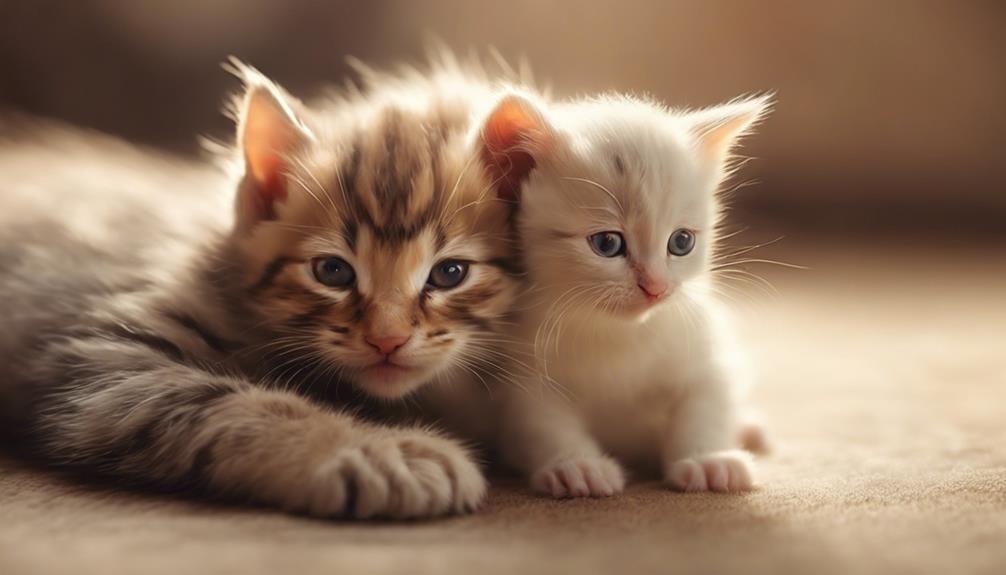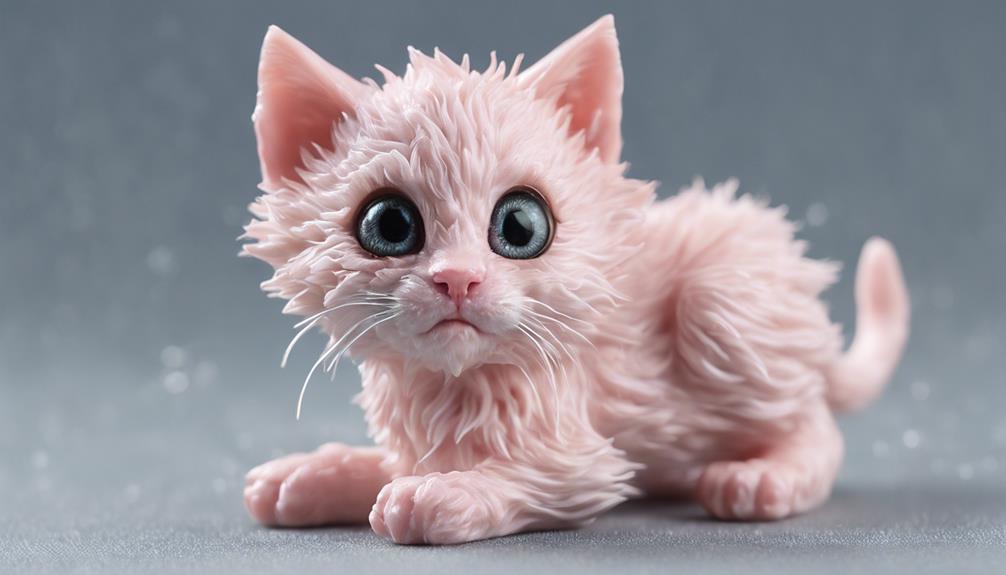Imagine waking up to your newborn kitten experiencing persistent hiccups that seem to cause discomfort. While it may be a common occurrence, knowing how to effectively help your kitten through these episodes can make a significant difference in their well-being.
Understanding the underlying causes and practical techniques for alleviating hiccups is essential in ensuring your kitten's comfort and health.
So, how can you provide the best care for your hiccuping feline friend?
Key Takeaways
- Monitor and manage hiccups in newborn kittens caused by air swallowing during nursing.
- Use soothing techniques like gentle patting and warm water to alleviate hiccups.
- Prevent hiccups by adjusting feeding positions and monitoring air intake.
- Seek veterinary advice if hiccups persist for over a day or show concerning patterns.
Understanding Newborn Kitten Hiccups
Experiencing hiccups is an important occurrence for newborn kittens due to their underdeveloped digestive systems. These tiny felines often struggle with regulating their eating process, leading them to swallow air while nursing from their mother cat. This ingestion of air can result in those adorable yet sometimes worrisome hiccups. It's important to make sure that the kittens have a proper latch while feeding to minimize the intake of air, hence reducing the occurrence of hiccups. Additionally, providing kittens with a comfortable and stress-free environment during meal times can also help decrease the likelihood of hiccups.
Newborn kittens rely heavily on their mother cat for nourishment and care, and observing their feeding habits can give valuable insights into their hiccup episodes. These hiccups are typically characterized by abdominal spasms and sometimes accompanied by wheezing sounds. Understanding that hiccups are a normal part of a kitten's early development can alleviate concerns. Proper feeding techniques and a supportive environment can aid in managing and reducing hiccups in these adorable little bundles of fur.
Recognizing Hiccup Symptoms

If you notice abdominal spasms and wheezing in your newborn kitten, these could be signs that they're experiencing hiccups. Hiccups in newborn kittens are a common occurrence and are often caused by factors like immaturity, swallowing air while eating, or the kitten's body heat regulation processes. To recognize hiccup symptoms in your little feline friend, here are some key points to take into account:
- Abdominal Spasms: Watch out for rhythmic contractions in the abdomen, indicating the diaphragm muscle twitching.
- Wheezing Sounds: Listen for unusual sounds like wheezing or gasping, which may accompany the hiccups.
- Frequency of Occurrence: Take note of how often the hiccups happen and if there are any patterns to their occurrence.
- Duration of Hiccups: Monitor how long the hiccups last; chronic hiccups could signal the need for veterinary attention to rule out any underlying issues.
Soothing Techniques for Hiccups

To help alleviate hiccups in your newborn kitten, try gently patting or rubbing their back as a soothing technique. This can help in releasing any trapped air that may be causing the hiccups. Additionally, offering a small amount of warm water mixed with kitten formula could help soothe their throat and potentially stop the hiccups. Creating a calm and quiet environment is also beneficial, as stress can exacerbate hiccups in kittens. Distraction techniques, such as playing with a toy, can divert your kitten's attention from the hiccups, allowing them to pass more quickly.
| Soothing Techniques | Description |
|---|---|
| Gently pat or rub back | Helps release trapped air causing hiccups. |
| Warm water with formula | Soothes the throat and may help stop the hiccups. |
| Calm environment | Reduces stress which can worsen hiccups. |
| Distraction with toy | Diverts attention, aiding in the passing of hiccups. |
Preventing Hiccups in Kittens

Preventing hiccups in kittens can be effectively achieved through implementing proper feeding techniques and maintaining a calm environment during meal times. To guarantee your furry companion stays hiccup-free, consider the following:
- Slow Feeding: Feed your kitten slowly to prevent them from swallowing excess air, which can lead to hiccups.
- Monitoring Habits: Keep an eye on your kitten's feeding habits and adjust techniques accordingly to minimize hiccups.
- Upright Position: When feeding your kitten, place them in an upright position to aid in proper digestion and reduce the chances of hiccups.
- Burping Kittens: Just like human babies, kittens may benefit from being burped after meals to release any trapped air and prevent hiccups.
When to Seek Veterinary Advice

To ensure the well-being of your newborn kitten, it is important to promptly seek veterinary advice if their hiccups persist beyond a day or intensify in frequency or duration. If you notice that your kitten's hiccups are becoming very frequent or lasting for extended periods, consulting a vet is vital. Veterinary evaluation is necessary for kittens with persistent or frequent hiccups as this could indicate an underlying health issue that needs attention. Immediate veterinary attention is needed if your kitten experiences sudden and constant hiccups, as this could be a sign of a more serious problem. Early veterinary intervention can help identify potential underlying health concerns related to persistent hiccups in kittens, ensuring that your furry companion receives the appropriate care and treatment.
| When to Seek Veterinary Advice | |
|---|---|
| – Hiccups persist for more than a day | – Hiccups become very frequent |
| – Hiccups are prolonged | – Sudden and constant hiccups |
| – Veterinary evaluation necessary | – Identify underlying health concerns |
Frequently Asked Questions
What to Do if a Newborn Kitten Has Hiccups?
If your newborn kitten has hiccups, gently pat their back to help release trapped air. Comfort them and make certain they burp after feedings. Monitor their diet and seek vet advice if hiccups persist for proper care.
How Do You Stop a Kitten From Having Hiccups?
To stop a kitten from having hiccups, comfort them gently, offer water in small amounts, and guarantee they feed properly to prevent air swallowing. Monitor their diet and habits closely. Consult a vet if hiccups persist.
How Do You Burp a 3 Day Old Kitten?
To burp a 3-day-old kitten, gently hold them against your shoulder, stomach down. Pat or stroke their back. Be careful due to their small size. Burping may not make noise but you'll feel the air release.
What to Do if My Newborn Kitten Is Gasping for Air?
If your newborn kitten is gasping for air, stay calm and assess for signs of distress. Watch for choking or abnormal chest movements. Seek immediate veterinary care to address any underlying health issues promptly.
Conclusion
To summarize, hiccups in newborn kittens are common but manageable with the right techniques.
Did you know that kittens can have hiccups up to 10 times a day?
By understanding the causes, symptoms, and soothing methods for hiccups, you can provide your furry friend with the care they need.
Remember to monitor their hiccups for patterns and seek veterinary advice if necessary to guarantee their health and well-being.










